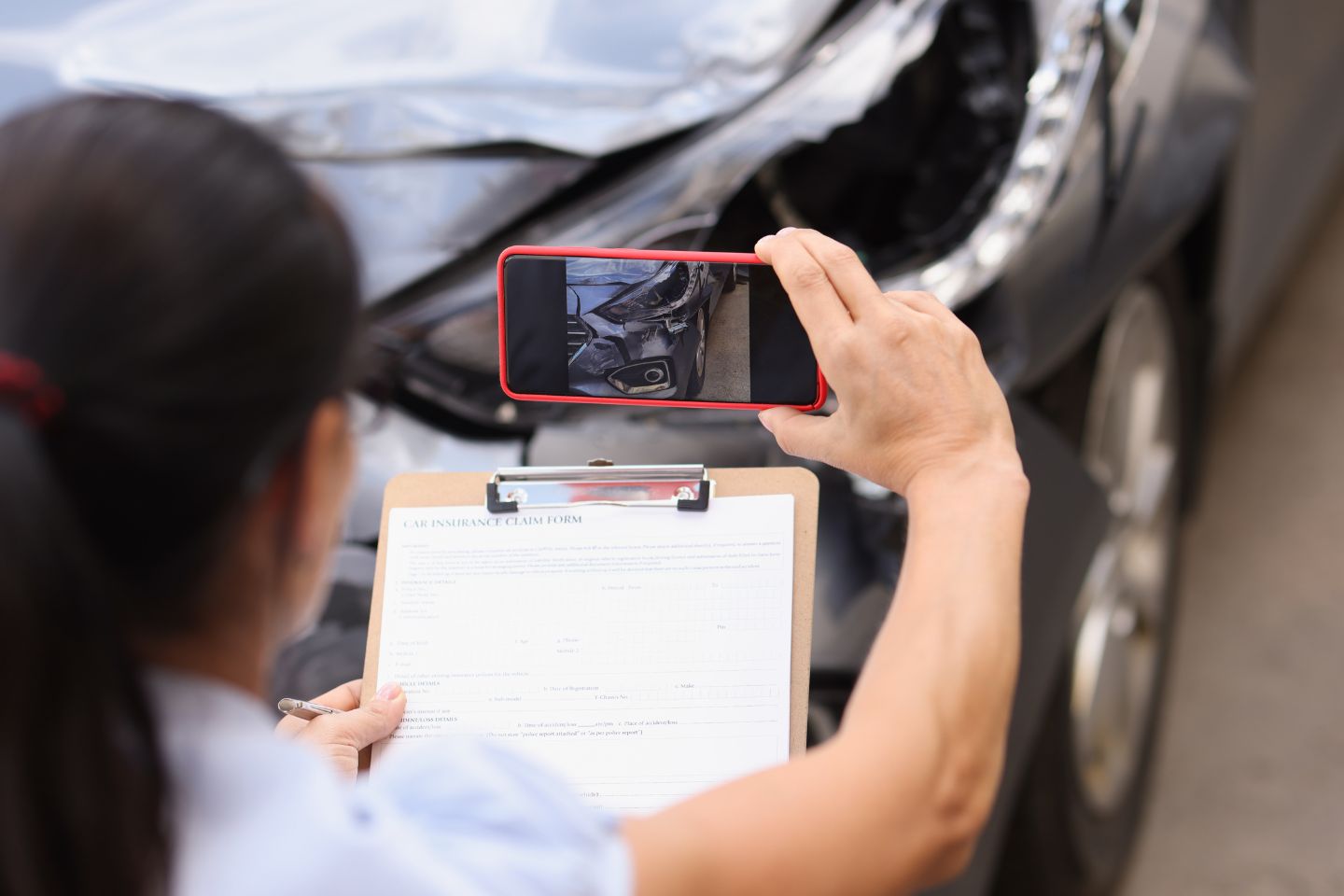To deal with an insurance adjuster after a car accident, avoid making a recorded statement until you have discussed your case with a Texas car accident attorney. Stick to the facts when speaking with the adjuster and avoid offering your opinion.
In addition, the adjuster may inspect the damages, review police reports, talk to witnesses, or request more information while evaluating your claim. Working with an experienced attorney can help navigate the process and ensure you receive fair compensation.
Understanding Insurance Adjusters
When dealing with an insurance adjuster after a car accident, it’s important to stick to the facts and avoid making a recorded statement before consulting with a car accident attorney in Texas. Insurers may request additional information and inspect damages during the claims process.
Who Are Insurance Adjusters?
Insurance adjusters play a crucial role in the aftermath of a car accident. They are representatives of the insurance company, responsible for investigating claims and determining the amount of compensation that should be provided to policyholders.
Insurance adjusters are typically employees of the insurance company or work for independent adjusting firms. Their primary objective is to protect the interests of the insurance company while assessing the damage and negotiating settlements with the policyholders.
The Role Of Insurance Adjusters
Understanding the role of insurance adjusters can help you navigate the process more effectively and ensure that you receive a fair settlement after a car accident. Here are the key responsibilities of insurance adjusters:
- Investigating the accident: Insurance adjusters gather information about the accident by reviewing accident reports, inspecting the damaged vehicles, taking photographs, and interviewing witnesses. They aim to reconstruct the sequence of events and determine liability.
- Assessing the damage: Insurance adjusters assess the extent of property damage and evaluate the cost of repairs or replacement. They may consult with experts such as mechanics or contractors to obtain accurate estimates.
- Evaluating injuries and medical expenses: If there are any injuries as a result of the accident, insurance adjusters review medical records, bills, and other documentation to determine the extent of the injuries and calculate the appropriate compensation for medical expenses.
- Negotiating settlements: Insurance adjusters directly negotiate with the policyholder or their legal representative to reach a settlement agreement. They consider various factors such as liability, damages, and policy coverage to determine a fair compensation amount.
- Maintaining communication: Throughout the claims process, insurance adjusters act as the main point of contact between the policyholder and the insurance company. They provide updates on the progress of the claim and address any concerns or questions the policyholder may have.
It’s important to understand that insurance adjusters work for the insurance company and their goal is to minimize the amount the company pays out in claims. This is why it’s crucial to be prepared and knowledgeable when dealing with them.
Importance Of Dealing With Insurance Adjusters
After a car accident, it is important to know how to deal with insurance adjusters. Avoid making recorded statements without consulting an attorney, stick to the facts, and seek legal assistance to protect your rights. Working with an experienced car accident attorney can help you navigate the insurance claim process and ensure you receive fair compensation.
Why It Is Important To Handle Insurance Adjusters After A Car Accident
Dealing with insurance adjusters is a crucial step in the aftermath of a car accident. It can significantly impact the outcome of your settlement process. Understanding the importance of handling insurance adjusters can help you navigate this process with confidence and increase your chances of receiving fair compensation for your damages.
How Insurance Adjusters Impact The Settlement Process
Insurance adjusters have a direct influence on the settlement process. Their role is to evaluate the details of the accident, assess the extent of damage, and negotiate a settlement amount on behalf of the insurance company. This makes it essential to handle adjusters effectively, as their decision can determine the amount of compensation you receive.
There are several ways in which insurance adjusters can impact the settlement process:
- Evaluating the value of your claim: Insurance adjusters will conduct an investigation to determine the cause of the accident and assess the damages incurred. They will consider factors such as medical bills, property damage, lost wages, and pain and suffering. It is important to provide accurate and thorough documentation to support your claim and ensure that all relevant damages are considered.
- Negotiating a settlement: Insurance adjusters aim to settle claims for the lowest amount possible. They may use various tactics, such as downplaying injuries or disputing liability, to reduce the settlement offer. Handling adjusters effectively involves being prepared, knowing the value of your claim, and advocating for fair compensation.
- Communicating with the insurance company: Insurance adjusters serve as the primary point of contact between you and the insurance company. They will gather information, request documentation, and relay settlement offers. Effective communication with adjusters can help ensure that your case is accurately represented and that your interests are protected.
By understanding how insurance adjusters impact the settlement process, you can approach these interactions with confidence and increase your chances of a favorable outcome. It is important to be proactive, prepared, and assertive when dealing with adjusters to maximize your chances of receiving fair compensation for your car accident.
Expert Tips For Dealing With Insurance Adjusters
When dealing with insurance adjusters after a car accident, it is important to stick to the facts and avoid making a recorded statement until you have spoken with a Texas car accident attorney. It is also crucial to work with the adjuster by providing necessary information and documentation for the claim.
When it comes to dealing with insurance adjusters after a car accident, it’s important to know the right approach to ensure a fair settlement for your claim. Stick to the facts and avoid offering opinions, avoid making a recorded statement without consulting an attorney, handle questions from insurance adjusters with caution, and understand common mistakes made by insurance adjusters. These expert tips will help you navigate the process smoothly and protect your rights.
Stick To The Facts And Avoid Offering Opinions
When communicating with insurance adjusters, it’s essential to stick to the facts of the accident and avoid sharing personal opinions. Insurance adjusters are skilled at gathering information that may work against your claim, so it’s important to be mindful of what you say. Stick to providing the necessary details, such as the date, time, location, and any witnesses present during the accident. By avoiding opinions, you can prevent any misinterpretation or manipulation of your statements.
Avoid Making A Recorded Statement Without Consulting An Attorney
Before making any recorded statement to an insurance adjuster, it is highly advised to consult with an experienced car accident attorney. While it may seem innocent to provide a recorded statement to help speed up the claims process, it can be used against you in the future. An attorney will ensure that you are fully prepared and aware of your rights before facing an insurance adjuster. This step can help protect you from unintentionally making damaging statements that could negatively impact your claim.
Handling Questions From Insurance Adjusters
When answering questions from insurance adjusters, it’s crucial to be cautious and thoughtful in your responses. Only answer the questions asked and avoid volunteering any additional information. Remember, insurance adjusters are working on behalf of the insurance company, and their goal is to protect their company’s interests. Be concise and factual, without offering unnecessary details that could be used against you later. Don’t be hesitant to ask for clarification if you don’t fully understand a question, and don’t feel rushed or pressured to give an immediate response.
Understanding Common Mistakes Made By Insurance Adjusters
It’s essential to understand that insurance adjusters can make mistakes during the claims process. By being aware of these common mistakes, you can safeguard your rights and ensure fair treatment. Some mistakes may include undervaluing your claim, wrongfully denying coverage, or delaying the settlement process. Remember, it’s within your rights to be informed about the progress of your claim, ask for explanations regarding any decisions or valuations, and seek a second opinion if necessary. By staying vigilant, you can protect yourself from any potential errors made by insurance adjusters.

Credit: malpracticecenter.com
Working With Insurance Adjusters
Dealing with insurance adjusters after a car accident can be a daunting task. These professionals work for the insurance company and their primary goal is to save the company money. It is essential to understand how to navigate the process of working with an insurance adjuster to ensure that your rights are protected and that you receive fair compensation for your injuries and damages.
The Process Of Working With An Insurance Adjuster
When it comes to working with an insurance adjuster, it’s important to have a clear understanding of the process. Here are some key steps:
- Contact the insurance company: After the accident, contact the insurance company as soon as possible to report the incident and initiate a claim. Provide basic information about the accident, such as the date, time, and location.
- Schedule an inspection: The insurance adjuster will schedule an inspection of your vehicle to assess the damages. Make sure to be present during this inspection and document any visible damages.
- Provide documentation: The adjuster will require documentation to support your claim. This may include medical records, repair estimates, and receipts for expenses related to the accident. Be prepared to provide these documents promptly.
- Negotiate a settlement: Once the adjuster has reviewed your claim, they will present a settlement offer. Evaluate the offer carefully and, if necessary, negotiate for a fair amount that covers all your damages and losses.
- Accept or appeal the offer: If you are satisfied with the settlement offer, you can accept it and close the claim. However, if you believe the offer is inadequate, you have the right to appeal and pursue further negotiations or legal action.
Steps To Take When Communicating With An Adjuster
Effective communication with the insurance adjuster can significantly impact the outcome of your car accident claim. Here are some steps to keep in mind:
- Be prepared: Before speaking with the adjuster, gather all the necessary information about the accident, including the police report, photographs, and witness statements. This will help you provide accurate and detailed information.
- Stick to the facts: When speaking with the adjuster, avoid offering opinions or speculating on the cause of the accident. Stick to the facts and provide only the information you know to be true.
- Be cautious with recorded statements: The insurance adjuster may request a recorded statement from you. Consult with a car accident attorney before agreeing to this, as your words can be used against you later in the claims process.
- Keep a record of communication: Document all communication with the insurance adjuster, including the date, time, and content of conversations. This can serve as evidence in case of any disputes or misunderstandings.
- Ask for clarification: If you don’t understand something, don’t hesitate to ask the adjuster for clarification. It’s crucial to have a clear understanding of all aspects of the claims process.
Negotiating With Insurance Adjusters
When dealing with insurance adjusters after a car accident, it’s important to stick to the facts and avoid making recorded statements without consulting a car accident attorney in Texas. By following these guidelines, you can ensure a fair negotiation process with the insurance company.
Strategies For Negotiating With Insurance Adjusters
Negotiating with insurance adjusters can be a daunting task, but with the right strategies, you can maximize your chances of getting a fair settlement offer. Here are a few effective strategies to keep in mind: 1. Gather evidence and document your damages: Before negotiating with the insurance adjuster, make sure you collect all the necessary evidence to support your claim. Take photographs of the accident scene, your damaged vehicle, and any visible injuries. Keep detailed records of medical bills, repair estimates, and lost wages. This documentation will strengthen your negotiation position. 2. Be organized and prepared: When dealing with insurance adjusters, being organized and prepared can make a significant difference. Create a file to keep all the relevant documents related to your claim. Keep track of all communication with the adjuster, including dates, times, and summaries of conversations. This will help you stay on top of your claim and avoid any confusion during negotiation. 3. Know the value of your claim: Before entering into negotiations, it’s essential to have a clear understanding of the value of your claim. Research comparable cases and consult with professionals, such as car accident attorneys or independent appraisers, who can provide you with an estimate. This knowledge will give you a realistic expectation and prevent you from settling for less than what you deserve. 4. Stay calm and professional: It’s crucial to maintain a calm and professional demeanor when negotiating with insurance adjusters. Emotions can hinder effective negotiation, so stay focused on the facts and the specifics of your claim. Avoid personal attacks or getting defensive and stick to presenting your case in a clear and logical manner. 5. Consider seeking professional help: If you find negotiating with the insurance adjuster overwhelming or feel that the offer is unfair, it may be beneficial to seek professional help. A car accident attorney can navigate the negotiation process on your behalf, ensuring you receive the maximum settlement offer. They have the expertise and experience to communicate effectively with the adjuster and advocate for your rights.Tips To Maximize Your Settlement Offer
When negotiating with insurance adjusters, consider these tips to maximize your settlement offer: 1. Be patient: Negotiations can be a lengthy process, so it’s important to be patient. Rushing into a settlement may result in accepting a lower offer. Take your time, gather all necessary information, and engage in thorough discussions with the adjuster. 2. Highlight the strengths of your case: Clearly communicate the strengths of your case to the insurance adjuster. Emphasize the evidence you have gathered, such as witness statements, police reports, or medical records. If there is clear liability on the other party, make sure it is evident in your negotiations. 3. Be realistic: While it’s important to aim for a fair settlement, it’s also crucial to be realistic about the potential outcome. Adjusters work to protect the interests of the insurance company, so expect some pushback. Understand the limitations and restrictions of your policy and work within those parameters. 4. Consider the long-term effects: When evaluating settlement offers, consider the long-term effects on your finances, health, and overall well-being. Factor in future medical expenses, ongoing treatments, and any potential long-term consequences of the accident. This will help you assess the adequacy of the settlement offer. 5. Stay persistent: Don’t be discouraged if the initial settlement offer is below your expectations. Negotiations are a back-and-forth process. Respond to low offers with detailed counterarguments and supporting evidence. By staying persistent, you increase the chances of reaching a more favorable settlement.How To Handle Difficult Adjusters
Dealing with difficult insurance adjusters can be challenging, but it’s crucial to handle them with patience and professionalism. Here are some tips for managing difficult adjusters: 1. Remain calm: It’s important to stay calm and composed even when faced with a difficult adjuster. Losing your temper or engaging in arguments will only complicate the negotiation process. 2. Stick to the facts: Focus on presenting the facts of your case and avoid getting into subjective debates with the adjuster. Stick to the evidence you have gathered and rely on objective information to support your claim. 3. Ask for clarification: If the adjuster is providing vague or unclear explanations, politely ask for clarification. Request specific details about the offer or any discrepancies you might have noticed. This will help you better understand their position and negotiate accordingly. 4. Document everything: Keep detailed records of all communications with the adjuster, including dates, times, and summaries of conversations. If disagreements arise, having a clear record of what was said can help resolve any disputes later on. 5. Consider involving a third party: If your interactions with the adjuster become unproductive or hostile, it may be necessary to involve a third party. A car accident attorney can step in and handle the negotiation process on your behalf, ensuring your rights are protected. Remember, negotiating with insurance adjusters requires patience, persistence, and preparation. By implementing these strategies and tips, you can increase your chances of securing a fair settlement offer.
Credit: www.facebook.com

Credit: theclardylawfirm.com
Frequently Asked Questions For How To Deal With Insurance Adjuster After Car Accident
What Is The Average Settlement For A Car Accident In Texas?
The average settlement for a car accident in Texas varies. It depends on several factors such as the severity of the accident and injuries. It is best to consult with a car accident attorney to determine the potential settlement amount for your specific case.
How Stressful Is Claims Adjuster?
Claims adjuster jobs can be highly stressful due to heavy workloads, challenging claimants, and difficult decisions. This can lead to chronic stress and burnout. It is important for adjusters to prioritize their mental health and find ways to manage stress effectively.
How Do You Answer Insurance Claim Questions?
When answering insurance claim questions: – Only answer the questions asked. – Don’t volunteer information or have your statement recorded. – Stick to the facts and avoid giving opinions. – Consult a Texas car accident attorney before making a recorded statement.
– Discuss your case with an attorney before dealing with an insurance adjuster.
Do Insurance Adjusters Make Mistakes?
Insurance adjusters are prone to making mistakes, although they may not admit to it. The difference between a good adjuster and an average one lies in the number of errors they make.
Conclusion
To effectively navigate the process of dealing with an insurance adjuster after a car accident, remember to stick to the facts and avoid making recorded statements without consulting an attorney. The adjuster may request additional information, inspect damages, and review police reports and witness statements.
It’s crucial to remain calm and handle the communication with the adjuster professionally. Seeking guidance from a Texas car accident attorney can help protect your rights and ensure a fair settlement. Remember, patience and persistence are key when dealing with insurance companies.


